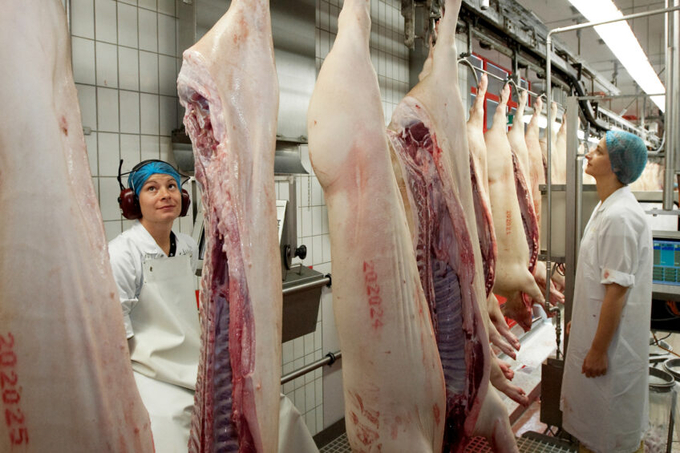June 9, 2025 | 06:10 GMT +7
June 9, 2025 | 06:10 GMT +7
Hotline: 0913.378.918
June 9, 2025 | 06:10 GMT +7
Hotline: 0913.378.918

Slaughterlines in Germany were slightly busier than last year in the first 6 months of this year. Photo: Ronald Hissink.
In the first 6 months of 2024, 21.9 million pigs were slaughtered in the number #2 pig country in the European Union. That was 0.4% or 78,100 animals more than in the same period last year, the federal statistics office Destatis reported. The increase follows a decrease by 6.9% of the number of slaughtered pigs in 2023.
Those slaughter figures resulted in a production of 2.1 million tons of pig meat, 22,400 tons or 1.1% higher year-on-year. After a long decline of the production figures, this is the first time since 2016 that pork production in Germany showed an year-on-year increase, the statistical authority comments.
In the first half of 2024, 21.1 million of pigs slaughtered came from German pig farms. That represents a share of 96.6%, 0.4% more than in the same time frame of 2023. The other 734,000 animals came from other countries, mostly the Netherlands, Denmark and Belgium, representing 3.4% of the total number of slaughtered pigs.
It should be noted that this figures have not yet been influenced by recent outbreaks of African Swine Fever (ASF) in the west of the country. Over the last few weeks, a number of new ASF cases were found in several states including Hesse, Rhineland-Palatinate and Badem-Württemberg.
The total meat production in Germany in the 1st half of 2024 amounted to 3.4 million tons, 1.3% more than in the first half of 2023. Altogether, German slaughter facilities processed 24 million pigs, cattle, sheep, goats and horses as well as 344.3 million chicken and other poultry. 62% of all the produced meat came from pigs, confirming that they still count for the vast majority of the total meat production in the country.
Meanwhile, earlier figures from Destatis show that the decline in pork consumption shows no signs of stopping. In 2023, roughly 2.92 million tons of pork were consumed in Germany, a decrease compared to the previous year figure of 2.97 million tons. Germans don’t seem to appreciate their own sausages as much as they used to do, while the increase in the consumption of meat alternatives also plays an increasingly important role.
(PP)

(VAN) With the war ongoing, many Ukrainian farmers and rural farming families face limited access to their land due to mines and lack the financial resources to purchase needed agricultural inputs.

(VAN) Vikas Rambal has quietly built a $5 billion business empire in manufacturing, property and solar, and catapulted onto the Rich List.

(VAN) Available cropland now at less than five percent, according to latest geospatial assessment from FAO and UNOSAT.

(VAN) Alt Carbon has raised $12 million in a seed round as it plans to scale its carbon dioxide removal work in the South Asian nation.

(VAN) Attempts to bring down the price of the Japanese staple have had little effect amid a cost-of-living crisis.

(VAN) Fourth most important food crop in peril as Latin America and Caribbean suffer from slow-onset climate disaster.

(VAN) Shifting market dynamics and the noise around new legislation has propelled Trouw Nutrition’s research around early life nutrition in poultry. Today, it continues to be a key area of research.